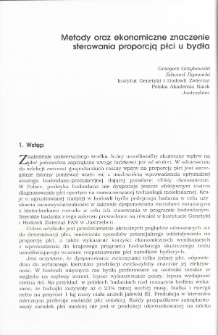- Search in all Repository
- Literature and maps
- Archeology
- Mills database
- Natural sciences
Advanced search
Advanced search
Advanced search
Advanced search
Advanced search

Object
Title: Metody oraz ekonomiczne znaczenie sterowania proporcją płci u bydła
Subtitle:
Journal of Biotechnology, Computational Biology and Bionanotechnology
Publisher:
Committee on Biotechnology PAS ; Institute of Bioorganic Chemistry PAS
Type of object:
Abstract:
Attending animals of only one sex, depending on the chosen type of production, wouldconsiderably increase its effectivity. The problem of sex determination is an element of crucialimportance in biotechniques of unconventional reproduction. In the case of cattle it gainedimportance with the development of breeding programmes based on multiple ovulation andembryo transfer (MOET). The control of proportions between sexes may be obtained either through separation (sorting) of spermatozoa subpopulations carrying chromosome X or Y, or bydetermining the sex of embryos (known as sexing) prior to their transfer to the uterus of therecipient cow. The current possibilities of sorting viable sperm are highly unsatisfactory for theneeds of artifical insemination. Thus, for the sex preselection DNA techniques are being introduced, using the latest results on sex determining region Y (SRY) and on polymorphism of thegene of amelogenine.
Relation:
Biotechnologia, vol.38, 3 (1997)-.
Volume:
Issue:
Start page:
End page:
Detailed Resource Type:
Format:
Resource Identifier:
0860-7796 ; oai:rcin.org.pl:145964
Source:
Library of Institute of Bioorganic Chemistry PAS
Language:
Language of abstract:
Temporal coverage:
Rights:
Creative Commons Attribution BY-SA 4.0 license
Terms of use:
Digitizing institution:
Institute of Bioorganic Chemistry of the Polish Academy of Science
Original in:
Institute of Bioorganic Chemistry of the Polish Academy of Science
Projects co-financed by:
Access:
Object collections:
- Digital Repository of Scientific Institutes > Partners' collections > Institute of Bioorganic Chemistry PAS > Articles
- Digital Repository of Scientific Institutes > Literature > Journals/Articles
Last modified:
Nov 18, 2020
In our library since:
Nov 3, 2020
Number of object content downloads / hits:
168
All available object's versions:
https://rcin.org.pl./publication/181186
Show description in RDF format:
Show description in RDFa format:
Show description in OAI-PMH format:
| Edition name | Date |
|---|---|
| Metody oraz ekonomiczne znaczenie sterowania proporcją płci u bydła | Nov 18, 2020 |
Objects Similar
Borkowska, Bożenna
Ziółkowski, Piotr Babula- Skowrońska, Danuta Kaczmarek, Małgorzata Cieśla, Agata Sadowski, Jan
Grzybowski, Grzegorz
Grzybowski, Grzegorz
Grzybowski, Grzegorz Lubieniecka, Joanna Kańtoch, Michał J.

 INSTYTUT ARCHEOLOGII I ETNOLOGII POLSKIEJ AKADEMII NAUK
INSTYTUT ARCHEOLOGII I ETNOLOGII POLSKIEJ AKADEMII NAUK
 INSTYTUT BADAŃ LITERACKICH POLSKIEJ AKADEMII NAUK
INSTYTUT BADAŃ LITERACKICH POLSKIEJ AKADEMII NAUK
 INSTYTUT BADAWCZY LEŚNICTWA
INSTYTUT BADAWCZY LEŚNICTWA
 INSTYTUT BIOLOGII DOŚWIADCZALNEJ IM. MARCELEGO NENCKIEGO POLSKIEJ AKADEMII NAUK
INSTYTUT BIOLOGII DOŚWIADCZALNEJ IM. MARCELEGO NENCKIEGO POLSKIEJ AKADEMII NAUK
 INSTYTUT BIOLOGII SSAKÓW POLSKIEJ AKADEMII NAUK
INSTYTUT BIOLOGII SSAKÓW POLSKIEJ AKADEMII NAUK
 INSTYTUT CHEMII FIZYCZNEJ PAN
INSTYTUT CHEMII FIZYCZNEJ PAN
 INSTYTUT CHEMII ORGANICZNEJ PAN
INSTYTUT CHEMII ORGANICZNEJ PAN
 INSTYTUT FILOZOFII I SOCJOLOGII PAN
INSTYTUT FILOZOFII I SOCJOLOGII PAN
 INSTYTUT GEOGRAFII I PRZESTRZENNEGO ZAGOSPODAROWANIA PAN
INSTYTUT GEOGRAFII I PRZESTRZENNEGO ZAGOSPODAROWANIA PAN
 INSTYTUT HISTORII im. TADEUSZA MANTEUFFLA POLSKIEJ AKADEMII NAUK
INSTYTUT HISTORII im. TADEUSZA MANTEUFFLA POLSKIEJ AKADEMII NAUK
 INSTYTUT JĘZYKA POLSKIEGO POLSKIEJ AKADEMII NAUK
INSTYTUT JĘZYKA POLSKIEGO POLSKIEJ AKADEMII NAUK
 INSTYTUT MATEMATYCZNY PAN
INSTYTUT MATEMATYCZNY PAN
 INSTYTUT MEDYCYNY DOŚWIADCZALNEJ I KLINICZNEJ IM.MIROSŁAWA MOSSAKOWSKIEGO POLSKIEJ AKADEMII NAUK
INSTYTUT MEDYCYNY DOŚWIADCZALNEJ I KLINICZNEJ IM.MIROSŁAWA MOSSAKOWSKIEGO POLSKIEJ AKADEMII NAUK
 INSTYTUT PODSTAWOWYCH PROBLEMÓW TECHNIKI PAN
INSTYTUT PODSTAWOWYCH PROBLEMÓW TECHNIKI PAN
 INSTYTUT SLAWISTYKI PAN
INSTYTUT SLAWISTYKI PAN
 SIEĆ BADAWCZA ŁUKASIEWICZ - INSTYTUT TECHNOLOGII MATERIAŁÓW ELEKTRONICZNYCH
SIEĆ BADAWCZA ŁUKASIEWICZ - INSTYTUT TECHNOLOGII MATERIAŁÓW ELEKTRONICZNYCH
 MUZEUM I INSTYTUT ZOOLOGII POLSKIEJ AKADEMII NAUK
MUZEUM I INSTYTUT ZOOLOGII POLSKIEJ AKADEMII NAUK
 INSTYTUT BADAŃ SYSTEMOWYCH PAN
INSTYTUT BADAŃ SYSTEMOWYCH PAN
 INSTYTUT BOTANIKI IM. WŁADYSŁAWA SZAFERA POLSKIEJ AKADEMII NAUK
INSTYTUT BOTANIKI IM. WŁADYSŁAWA SZAFERA POLSKIEJ AKADEMII NAUK




































